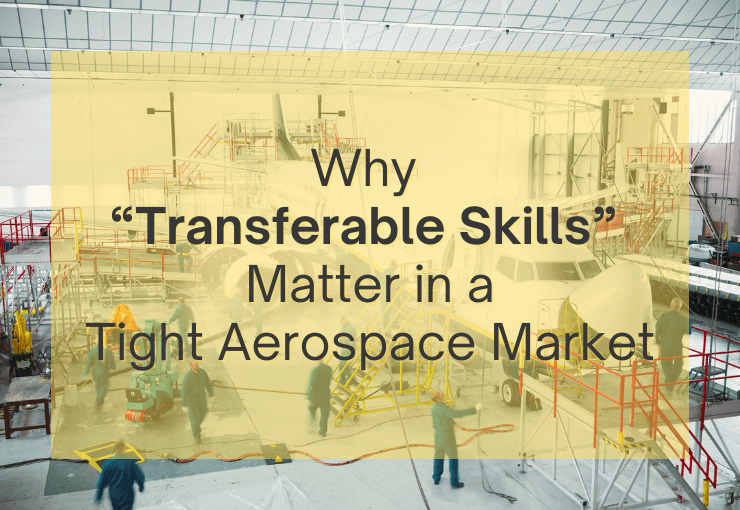
Hiring’s tough right now—especially in aerospace. You need skilled people on the floor yesterday, but the resumes aren’t piling up like they used to. Not to mention, the multiple steps of each hiring process.
So what do you do when the perfect candidate doesn’t exist?
You stop chasing perfect.
And start looking for potential.
Let’s talk about why transferable skills are the most overlooked advantage in today’s tight labor market—and how they can help you build a stronger, more agile team.
The Talent Crunch Is Real—and It’s Not Going Away
Between retiring Baby Boomers, supply chain surges, and record demand for aircraft production, the aerospace industry is facing a serious workforce gap. According to The US Bureau of Labor Statistics suggests that “aerospace engineer employment is predicted to grow by 6% from 2021 to 2031.”(1, 2024)
And it’s not just engineers. Machinists, welders, quality techs, maintenance leads—companies are struggling across the board to find qualified talent.
To make matters worse, you’re competing with automotive, energy, and tech industries for the same skillsets.
If you’re only hiring people with aerospace experience, you’re fishing in a shrinking pond, with attrition rates reaching as high as 13%—for non-retirement reasons—for member companies of the The U.S. Aerospace Industries Association (AIA) (2 and 3, 2023).
So, where can a hiring manager find qualified talent? Well, it could be right in front of you.
What Are Transferable Skills—and Why Should You Care?
Transferable skills are the real-world capabilities that carry over from one role or industry to another. Think:
-
Reading blueprints and technical drawings
-
Operating CNC machinery or precision tools
-
Troubleshooting complex systems
-
Working within regulated environments
-
Leadership and cross-team collaboration
These are industry-agnostic, and that’s the point. A former automotive technician or military veteran may not have “aerospace” on their resume, but they’ve got the goods—they just need the right runway.
Why They Matter Right Now
Here’s what happens when you hire based on skills, not labels:
1. You Fill Jobs Faster
Waiting on unicorns = unfilled roles.
Broadening your scope shortens time-to-hire and keeps production moving.
2. You Build a Smarter, More Adaptable Team
People from outside aerospace often bring new ways of thinking. They spot inefficiencies, question assumptions, and adapt fast.
3. You Get Long-Term Value
When you invest in people with a growth mindset, they stick. You’re not just plugging a hole—you’re developing future leaders.
Boeing and Lockheed Martin are increasing their upskilling programs, with Martin investing as much as $5 million (4, 2018)
In a 2023 interview with Fortune, Lockheed Martin announced it had exceeded that five-year pledge one year ahead of plan (5, 2023).
And let’s be honest—if these aerospace giants are investing that much, it’s probably a good time to ask: are you all?
How to Spot Transferable Talent (Without Getting Burned)
Hiring someone from outside the industry doesn’t mean you’re taking a gamble—it just means you need a sharper lens.
Here’s what we recommend:
-
Rethink your job descriptions. Focus on core capabilities, not a list of must-haves no one has.
-
Ask better interview questions. Dig in to how candidates solve problems, follow procedures, or adapt to new environments.
-
Use task-based screening. Hands-on assessments tell you a lot more than buzzwords on a resume.
-
Partner with a recruiter who gets it. At US Enhanced, we’re built for this. We know manufacturing. We know aerospace. And we know how to spot skills that stick—even when they show up in unexpected places.
What You Can Do Today
If your hiring funnel feels like it’s drying up, don’t panic. Just pivot. Here’s where to start:
1. Audit your open roles. Where can you sub in experience from other industries?
2. Talk to your team. What skills matter most for success? What can be taught?
3. Update your hiring process. Less red tape, more practical testing.
4. Call in backup. If your internal team’s overloaded, that’s what we’re here for.
Let’s Build a Workforce That Actually Works
You don’t need perfect people. You need smart, capable ones who are ready to roll up their sleeves and get to work.
That’s what we do at US Enhanced—find great talent, from all walks of life, with the grit and skills to thrive in aerospace, manufacturing, and more.
Let’s talk. We’ll help you rethink your hiring strategy—and connect you with people who can hit the ground running.
Sources

